Swiss campaign of Suvorov and his wonder-heroes
Marshal Massena
The Swiss campaign of Russian troops under the command of Alexander Vasilyevich Suvorov (10 (21) September - 27 September (8 October) 1799) was an outstanding transition of the army through the Alps. This is a classic example of military operations in the mountains and the crown of glory of the great Russian commander.
Hike history
The hike through the Alps was a continuation of the Italian campaign: by the end of August 1799, as a result of the actions of A. Suvorov’s army in Italy, from the sea, our troops were supported by the squadron of Vice Admiral F. F. Ushakov (Mediterranean campaign), almost the entire peninsula was liberated from the French forces The remnants of 35-thousand-strong French army of General Jean Moreau (about 18 thousand people), it was defeated at Novi, retreated to Genoa. Genoa district remained the last region of Italy under the control of the French. Therefore, the operation to defeat the Genoese grouping of the French by the Russian-Austrian army under the command of Alexander Suvorov (about 43 thousand people), which would lead to full control over Italy, seemed the natural next step.
After that, Suvorov planned to carry out a campaign against Paris. And Napoleon, another military genius of the time, was at that time in Egypt, a Russian commander who had not yet lost a single battle, there was no one to stop.
But brilliant victories of Russian weapons caused alarm in Vienna and London - among our “allies” in that war. After the complete liberation of Italy and the capture of Paris, Russian positions in Europe became too strong, and Russia could leave its military forces on a permanent basis on the Apennine Peninsula. For London, strengthening the position of the Russian Empire in the Mediterranean region was like a knife blow to the chest.
That is why the "allies" began to demand from Russia to go to Switzerland in order to free it from the French forces. Although it is clear that a blow to Paris automatically solved this problem. Now it is clear that Austria and England wanted to destroy not the French in Switzerland, but the Russian army of the “miracle heroes” of Suvorov and our military genius. It was understood by Suvorov himself, who said the following: “They drove me to Switzerland to destroy it there.” Unfortunately, the Russian Emperor, the romantic knight Paul I, did not understand this then, he understood only later, breaking off relations with the "allies", concluding an alliance with Napoleon and starting preparations for a strike against England - a campaign in India.
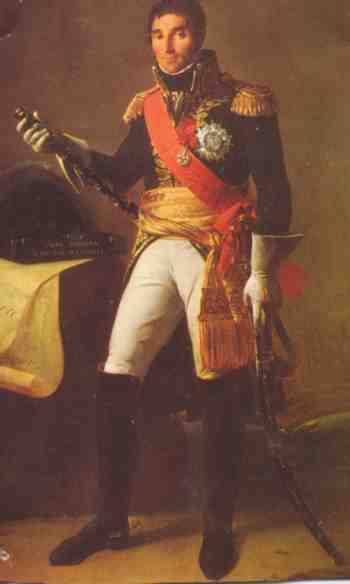 André Massena, titles: Duke de Rivoli, Prince of Eslinga (6 in May 1758, Nice - 4 in April 1817) - the commander of the French Republican Wars, and then the empire of Napoleon I.
André Massena, titles: Duke de Rivoli, Prince of Eslinga (6 in May 1758, Nice - 4 in April 1817) - the commander of the French Republican Wars, and then the empire of Napoleon I.The Austrians planned to withdraw all their forces from Switzerland (58 thousand people) and throw them to the aid of the English-Russian landing force planned for the Netherlands (30 thousand). The Austrian troops wanted to replace the army of Suvorov (about 21 thousand) and the Russian corps of Alexander Rimsky-Korsakov (Switzerland 24 thousand) in Switzerland. Pavel agreed, but demanded that Vienna, before the withdrawal of the Austrian forces, cleanse Switzerland of French troops. The Austrians made a promise to do it, but did not fulfill it and began to withdraw. The Russian corps was left alone against the French army under the command of Massena (84 thousand). True, it should be noted that the Archduke Karl, 18 (29) August 1799 began the withdrawal of the Austrian forces, realizing that after the withdrawal of the Austrian army, the Russian troops fall into a desperate situation, under his personal responsibility, temporarily, until the arrival of Suvorov’s army, he left on the Swiss front 22 thousand troops under the command of General Friedrich von Hotz.
The Russian army, commanded by Suvorov, marched towards Switzerland on 7 am 31 August (10 September) 1799, after the surrender of the French garrison in Tortona. September 10 actually began the Swiss campaign, which resulted in a series of large and small battles, clashes, the constant feat of Russian soldiers.
Main events
From the very beginning the problems started - the Austrians had to prepare pack animals, food and fodder. But when the Russian army approached the mountains, there was nothing, I had to spend several days collecting the missing food, ammunition. Given that the whole trip was going 17 days, the loss of this time was very important.
On September 12, Russian forces attacked the French forces of the right wing, which defended St. Gotthard and the valley of the River Rois, commanded by K.Z. Lekurb. Directly the battle against the Russian troops led the team of Gudin (4,3 thousand people) and the supporting team of its Loison (the same number). Our forces occupied St. Gothard. At this time, Andrei Grigorievich Rosenberg (he commanded the forward column), started the movement at dawn on September 13 from Tavech, walked along the Reiska Valley, crowding French troops, and in the evening drove them away to the village of Urzern.
14 (25) of September, after connecting with the Rosenberg column in Urzern, Alexander Suvorov sent a regiment under the command of General Kamensky to the left bank of the River Reuce (Reuss), his task was to get behind enemy lines at the Devil's Bridge. The commander led his forces to the north by the right bank, but he met natural barriers - the so-called Urzern hole and the Devil's bridge. The Urzern hole was a narrow and low gallery, which was pierced in the rocks surrounding Roiss, 64 long in meter and width, which allowed only one person with a bag to pass. Then the road steeply descended to the bridge - a narrow stone arch without a railing 20-meter-long, thrown across the River Rois at the height of 22 — 23 meters. But the “miraculous heroes” of Suvorov, under the command of Colonel Trubnikov, managed to bypass the tunnel guarded by the French over the mountains and the river gorge and with a sudden blow broke the French squad. Then the French, who were on the opposite bank, began to destroy the bridge, but did not have time to completely break down, because Kamensky’s soldiers appeared in the rear. Russian soldiers dismantled a nearby barn and logged the failure closed. The first to enter this crossing was an officer Meshchersky-third, who was struck by the French fire, but the French could not stop the Russian soldiers, they forced the barrier under enemy fire and threw the enemy back. Then, in a few hours, the Devil's Bridge was repaired more thoroughly, and the main forces of Suvorov began to cross over it.
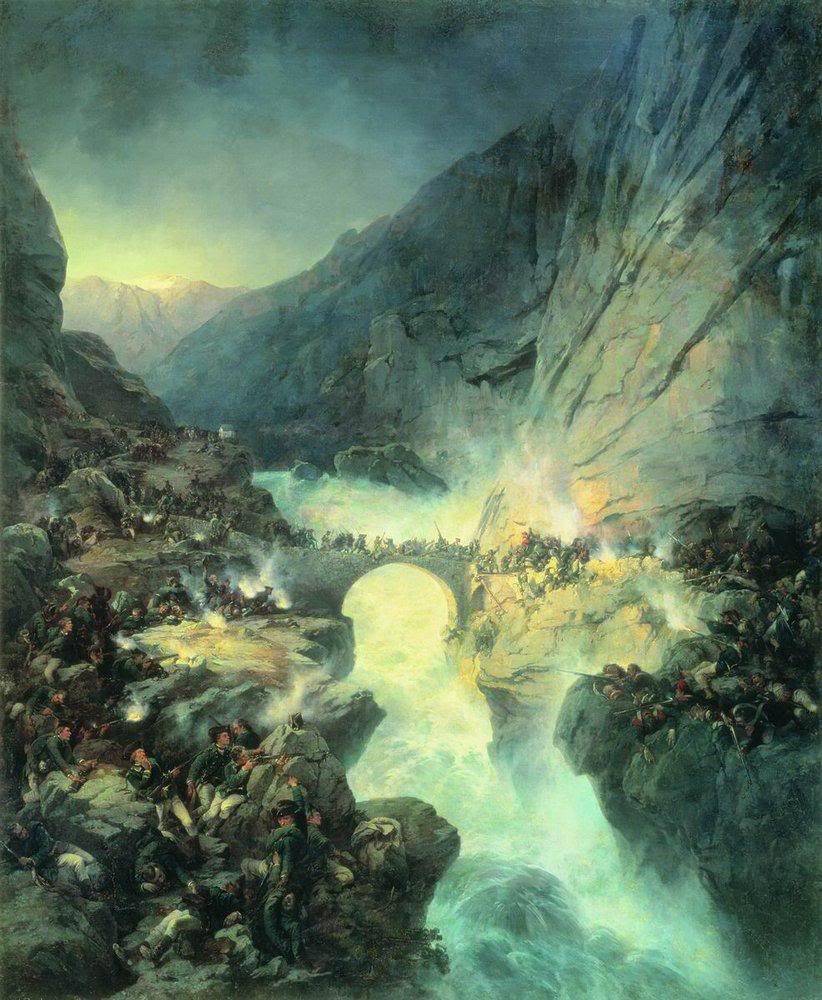
Suvorov Crossing the Devil's Bridge. Artist A. E. Kotzebue.
The problem of further movement
September 15 tired, frozen and hungry Russian units, according to the plan, arrived in the town of Altdorf. There they were waiting for a new unpleasant "surprise." It turned out that there was no further road here! The French did not destroy it and the elements did not destroy it - there was never a road, just the Austrian allies "forgot" Suvorov to inform about it. Schwyz, where the army was going, could only be reached via Lake Lucerne, but the French seized all means of transportation there. Only 2 roads existed from Altdorf - from the Shahinskaya valley to the headwaters of the Lint river and from the Maderan valley to the headwaters of the Rhine. But neither the one nor the other road led to Schwyz and to the connection with the Rimsky-Korsakov building.
The situation was critical. Suvorov learns about the presence of two mountain paths, which now you can walk with climbing equipment. They led through the passes of Rose-Alp-Kulm (2172 meters) and Kinzig-Kulm (2073 meters), through the Roshtok snow ridge to the village of Muten, and from there went the road west to Schwyz. It was a difficult choice: the reserves of supplies were already exhausted, the shoes were worn out, the troops were tired of the week march and fighting in the mountains. Need was steel will and confidence in their own strength and people, all this was Alexander Suvorov. The commander decides to follow the shortest path - 18 km, through the Kinzig-Kulm pass.
With the dawn of 16 (27) September, the Russian army advanced. Bagration walked with the vanguard, followed by parts of generals Derfelden and Aufenberg, then packs. The rear remained to cover Rosenberg. And for good reason, parts of Rosenberg during the transition of the main forces of Suvorov repulsed two attacks by the French corps of Lekurb. Parts of Rosenberg in two columns went 17 and 18 on September, and Lecourbe only in the morning of 18 did he understand where Suvorov’s army had gone, and sent messages to Massenet and other French commanders. It was an unprecedented transition, a real feat of the Russian Spirit. That is why then the local Swiss put up monuments to the Russian army. Through 12 hours, the avant-garde reached the village of Muten and seized the French post without a fight (150 people). By the evening of 17, the army’s tail also came up.
The last pieces of the rearguard of Rosenberg came to the Muten Valley of September 18. On the same day, Alexander Suvorov received a written report about the defeat of the corps of Rimsky-Korsakov (14-15 of September) and the Austrian detachment of Hotz (September 14), of General Linken.
Suvorov Crossing the Alps. From the picture of A.Popov 1903-1904
Exit from the environment
It turned out that, having made one unparalleled feat, the army was on the verge of death or shameful surrender. The corps of Rimsky-Korsakov was defeated in a desperate two-day battle with superior enemy forces. Suvorov then wrote to the Archduke Carl: "For the blood shed near Zurich, you will answer before God."
Going to Schwyz, occupied by the main French forces, was pointless. The Russian army was surrounded in the Muten Valley, one on one with the superior forces of the enemy, with a limited amount of ammunition and food, exhausted by the difficult transition through the mountains. Suvorov in the refectory of the female Franciscan monastery of St. Joseph held a military council. There the words were spoken, in many respects consonant with the speeches of Prince Svyatoslav before the decisive battle (see Appendix), and it was decided to break through from the encirclement to the town of Glarus.
18-th army moved: the Austrian brigade of Aufenberg climbed Bragelberg, shot down French security units and descended into the Klenthal valley, followed by units of Bagration, the division of Schweikovsky and the main forces. Rosenberg, with 4 thousands, stood at Muten and covered the rear.
The French were inspired by their success, and in the French army victorious moods reigned, but soon they would have to wash with blood and forget about the victory over the great Suvorov and his “wonder-heroes”. Massena planned to firmly lock up the Russian army in the valley. And then force her to surrender. Part of the French forces were sent to the exit of the Klenthal valley. The commander himself with 18-thousand. corps headed for Schwyz, to strike at Muten, on the rear of the army of Suvorov.
19 (30) September, the Austrian brigade of Aufenberg fought with the French brigade of General Gabriel Molitor and was on the verge of defeat. But Bagration rescued her: the French were defeated, they fled, more than 200 people drowned in Lake Ruthen. 20 September saw a head-on battle of approximately equal forces (5-6 thousand people), the French were defeated, suffered heavy losses, the path to Glarus was opened. But soon the situation changed: the Gazan division approached the crushed Molitor. Now the French had superiority in forces, the battle broke out with a new force, the village of Nephels 5-6 once passed from hand to hand, but in the end remained for Bagration.
Suvorov, in order to avoid big losses, ordered Bagration to retreat to Netzstal, in the evening of 20, the main forces of the Russian army were concentrated at Glarus.
Battle of Muten Valley
At the same time, in the rear, a battle was fought between the forces of A. Rosenberg and the troops of André Massena. 19 September 10-th. Massena forces attacked 4 thousand Rosenberg. The first Russian line under the command of Maxim Rebinder (Suvorov called him by name as a sign of great respect) stopped the enemy; when the second line came up - under the command of Mikhail Miloradovich, the Russian troops launched a counterattack. The French overturned and drove 5 kilometers to Schwyz, where, on the orders of Miloradovich, they stopped.
At night, the last supplies were lowered to Muten from the pass and three regiments approached. Rosenberg's forces grew to 7 thousand bayonets. 20-th Massena decided to deliver a new decisive blow and threw about 15 thousand people into battle, they walked in three columns, having in front of a dense chain of shooters. The Russian forward detachment under the command of Miloradovich conducted a shootout with the enemy and retreated. Suddenly, the Russian detachment went to the side, and before the French were the main forces, they were built in two three-rank lines at a distance of 300 meters from each other. In reserve there were two regiments. And then the Russians were stunned by the French. They quickly closed the gap, and hand-to-hand combat began. They attacked so fiercely and desperately that some second-line battalions were ahead of the first line. The French did not stand the onslaught, they were seized with panic, and soon the battle grew into the extermination of the French troops. Massenu himself was almost captivated: non-commissioned officer Ivan Makhotin pulled him off his horse and grabbed him by the collar. Togo was saved by the fact that a French officer attacked Makhotina, and while Makhotin stabbed him, Massena fled, leaving only his golden epaulet in the hands of the Suvorov hero.
It was a complete rout, the French soldiers, pursued by the Cossacks, surrendered to the crowds: only the dead were 3-6 thousand, the prisoners more than a thousand, our total losses were about 700 people. Shocked Massena did not dare to organize a new attack.
Rosenberg also misled Massena: the commander gave an order to the population of Schwyz to procure food for two days for the entry of 12-thousandth Russian forces. Massena knew about the mastery of Glarus, but decided that this was an auxiliary strike, and the main attack would be through Schwyz on Zurich. Therefore, he handed over command under Schwyz Soult and set off near Zurich to organize defense against the blow of the restored Rimsky-Korsakov corps. As a result, Massena, who had a significant numerical superiority, refused to take active steps. Rosenberg could 3-days, without the opposition of the enemy, to go to the connection with Suvorov.
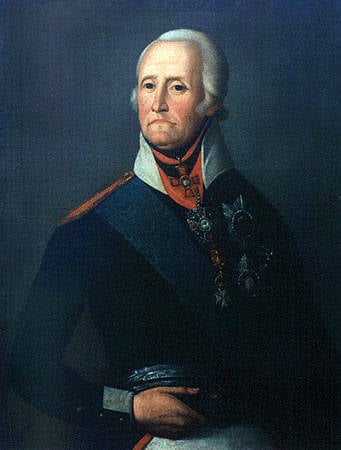 Andrei Grigorievich Rosenberg (21.1.1739, Riga - 25.8.181, Black Podolsk Governorate) - Russian general from infantry.
Andrei Grigorievich Rosenberg (21.1.1739, Riga - 25.8.181, Black Podolsk Governorate) - Russian general from infantry.Further movement of the Russian army
Arriving in Glarus, Alexander Suvorov saw that the last hope for help and assistance of the Austrian forces had disappeared. The Austrian General Linken with his squad left for no reason from the Lint valley and retreated to Graubünden. 21 September (2 October) from the forces of Suvorov separated and retreated for Linken brigade Aufenberg. Then, in order to save his troops, Suvorov decided to turn south and go to the town of Ilanz (via Schwanden, Elm, Ringenkopf, into the valley of the River Rhine). This decision was finally made at the September 23 Military Council.
The army left the night from 23 to 24 in September, the structure was changed: the leading forces led Mikhail Miloradovich, followed by units of Andrei Rosenberg and Wilhelm Derfelden, and the rear was protected by Peter Bagration, who distinguished himself as an excellent rearguard commander, who repeatedly attacked the party, who supported him, who supported him, who distinguished himself as an excellent rearguard commander, who repeatedly attacked the party, who joined the patron, who had joined the patron.
After midnight on September 25 (October 6), the Russian forces, no longer pursued by the enemy, set off across the Ringenkopf Pass (height in 2,4 thousand meters). It was a very difficult transition: the path could only be walked alone, there was a thick fog, they walked with snowfall and strong wind, the snow cover reached half a meter. The transition killed up to 200 Russian soldiers, even higher losses were in the captured French - to 1400 people. I had to throw all the guns. I had to spend the night on the pass, 26 was going down, in the evening of that day the Russian troops reached Ilanz, and on September 27 - the city of Chur. There, people were able to relax and eat normally, in Kurer the army was 2 of the day. On this Swiss campaign ended.
Results
- Alexander Suvorov once again proved his military genius, who remained unclouded, and the Russian soldiers had their magnificent fighting qualities.
- Russia received another lesson about trusting “allies”.
- The objectives of the operation - the complete defeat of the French army and the cleansing of the French from Switzerland - were not achieved due to the treachery or stupidity of the Austrians. Although the troops of Alexander Suvorov single-handedly defeated the first right wing of the French under the command of J. Lecoub, who defended himself in almost inaccessible positions, and then the center of the enemy under the command of Andre Massena.
- The largest researcher of the Swiss campaign D. Milyutin. The total losses of the army of A. Suvorov in the Swiss campaign were estimated at 5,1 by thousands of people, of which 1,6 thousand killed, including those who died not in battle, but frozen, crashed during crossing passes, and around 1 Thousands of wounded. This is from 21-th. army, marching in the campaign. Thus, from the environment Suvorov led more than 3 / 4 troops. The total losses suffered by the French forces are not precisely known, but it is clear that they were significantly higher than the Russian losses. So, only their damage in the battle in the Muten Valley was comparable to the total losses of the entire army of Suvorov. The Russian commander himself believed that the French suffered losses in 4 times more than his army. 2,8 thousand Frenchmen were taken prisoner - half of them died while passing through the Ringenkopf Pass. And this despite the fact that, descending into the Muten Valley, Suvorov sought not to destroy the French army, but to withdraw the army from its encirclement.
- The Swiss campaign of the army of Suvorov was one of the largest example of conducting military operations in the mountain theater.
- This campaign was the real crown of military glory of the Russian commander, the highest point of the victories of the Russian weapons in the 18 century. Pavel praised the activities of Suvorov - “Winning enemies of the Fatherland everywhere and throughout your life, you lacked one thing - to overcome nature itself, but you have gained the upper hand over it now.” The commander received the highest military rank of the Russian Empire - the Generalissimo. The troops were to give Suvorov honors, equal to the imperial, even in the presence of the king.
- Pavel I was enraged by the meanness of the “allies”, recalled the ambassador from Vienna, dissolved the alliance with Austria. In the same year, he recalled the ambassador from England, the Russian corps in Holland, who was under the command of the British, literally "disappeared" because of famine and disease. Pavel abruptly changed the orientation of his foreign policy, began a rapprochement with France and challenged the British Empire.
Unfortunately, Alexander Vasilyevich Suvorov could not enjoy the well-deserved awards and honors, bring new victories to Russia, May 6 (18) he went to the heavenly retinue ... Eternal memory to the greatest Russian military leader and his wonder-heroes! We must remember that our ancestors had to shed rivers of blood and sweat, correcting the mistakes of others and the betrayal of the "allies."
Application. Suvorov's speech, recorded with the words of Bagration at the military council in the monastery of St. Joseph.
"We are surrounded by mountains ... surrounded by a strong enemy, proud of victory ... Since the time of the Prut affair, under the Emperor Peter the Great, the Russian troops have never been in such a threatening situation ... No, this is no longer a betrayal, but an obvious betrayal ... sensible, calculated betrayal us, who shed so much blood for the salvation of Austria. There is no one to wait for help now, one hope for God, another for the greatest courage and the highest self-denial of the troops you led ... We will have the greatest, unprecedented works in the world! We are on the edge of the abyss! But we are Russians! God with us! Save, save the honor and wealth of Russia and its Autocrat! .. Save his son ... "The elder after Suvorov, General Derfelden, on behalf of the whole army, assured Suvorov that everyone will do their duty:" We will transfer everything and do not disgrace the Russian weapon, and if we fall then we shall die with glory! Lead us where you think, do what you know, we are yours, father, we are Russians! ”-“ Thank you, ”answered Suvorov,“ I hope! Glad! Have mercy on God, we are Russian! Thank you, thank you, we will smash the enemy! And victory over him, and victory over deceit will be victory! ”
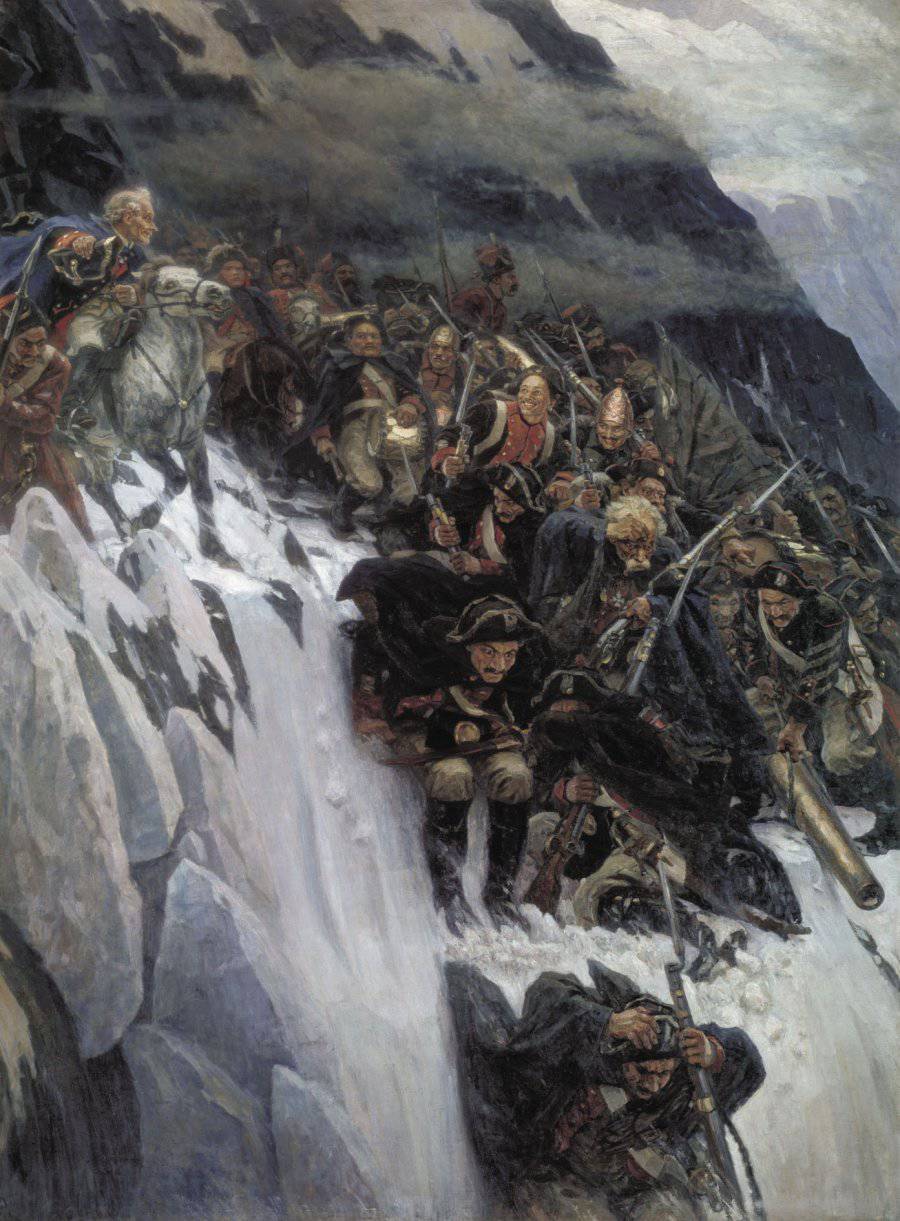
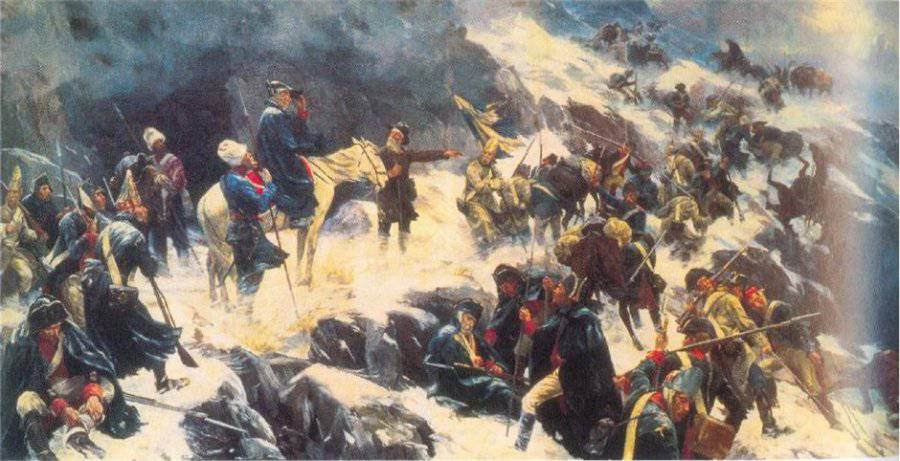
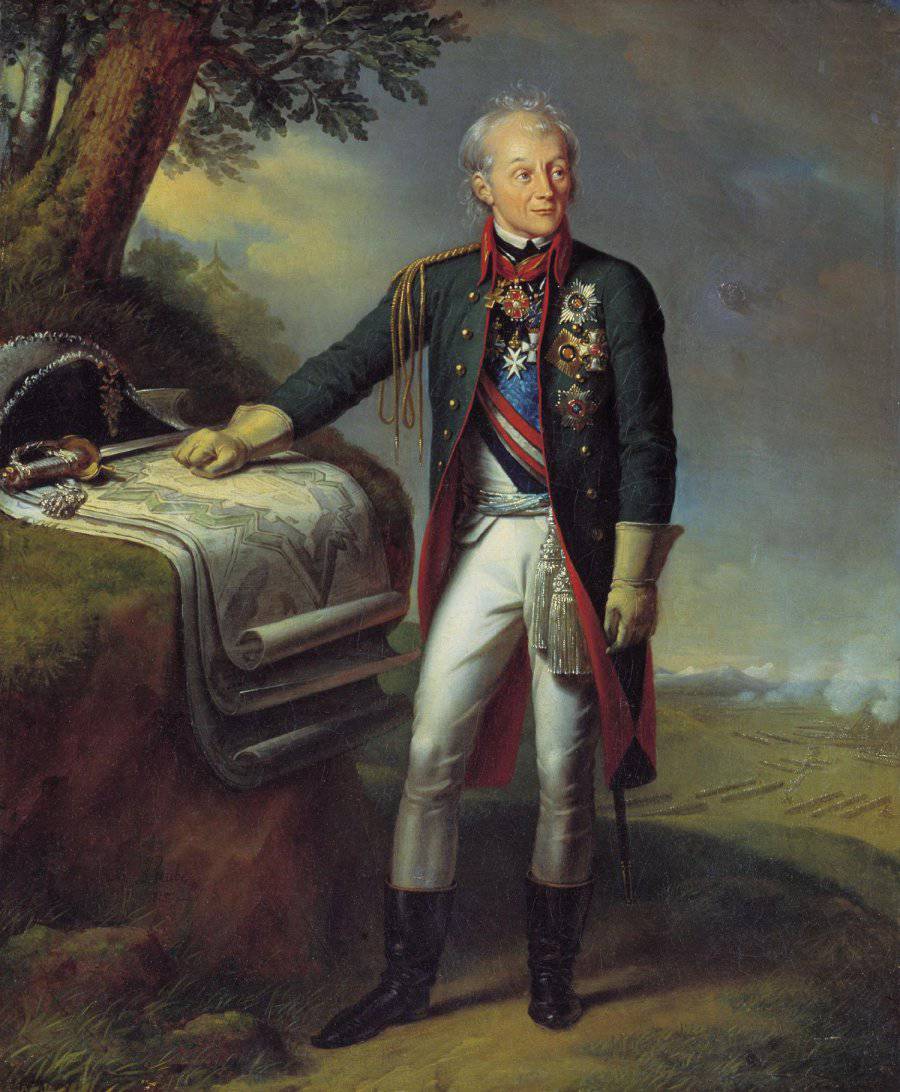
Information